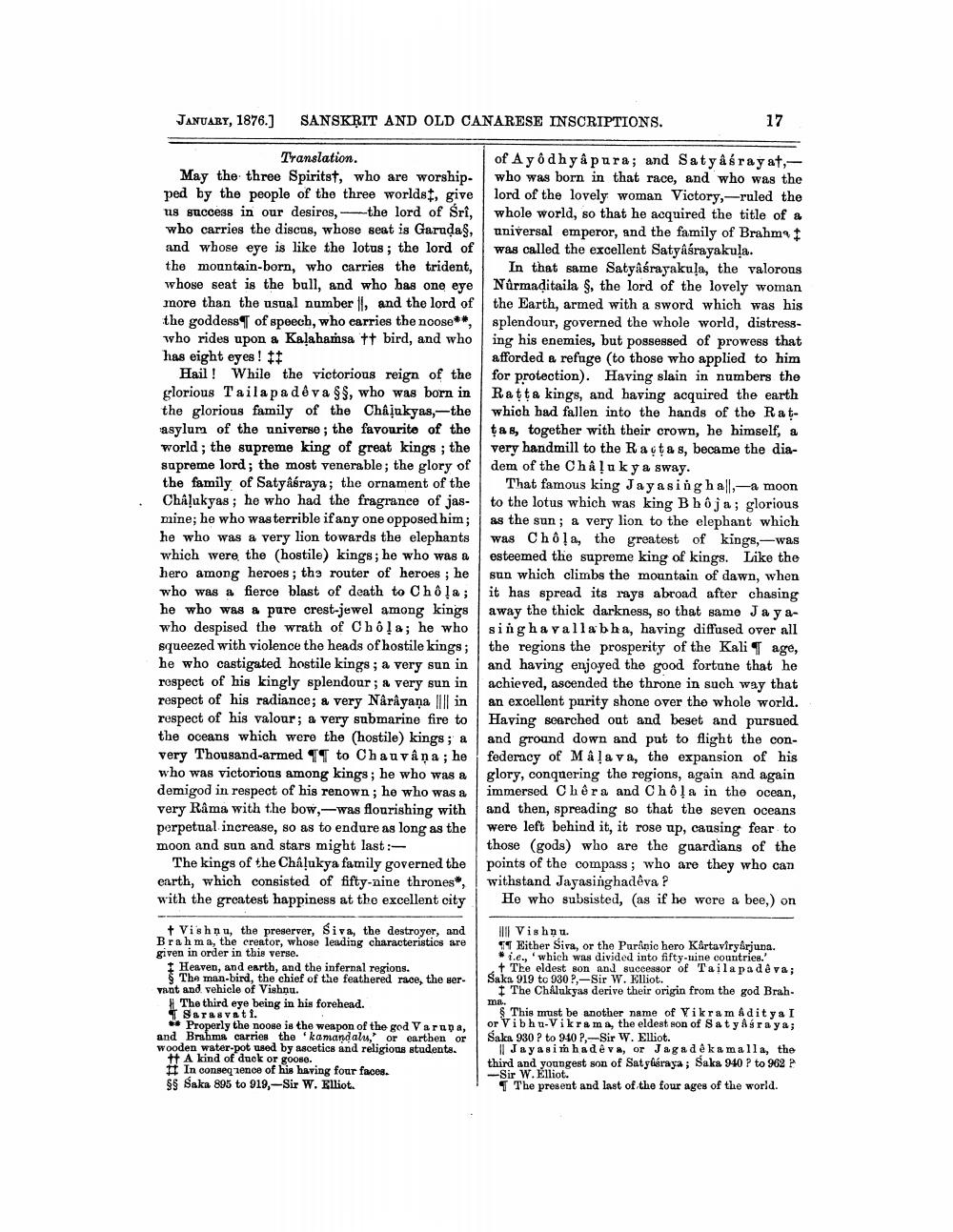________________
JANUARY, 1876.] SANSKRIT AND OLD CANARESE INSCRIPTIONS.
Translation.
May the three Spiritst, who are worshipped by the people of the three worldst, give us success in our desires, the lord of Śri, who carries the discus, whose seat is Garuda§, and whose eye is like the lotus; the lord of the mountain-born, who carries the trident, whose seat is the bull, and who has one eye more than the usual number, and the lord of the goddess of speech, who carries the noose**, who rides upon a Kalahamsa ++ bird, and who has eight eyes! ‡‡
Hail! While the victorious reign of the glorious Taila pa dêva §§, who was born in the glorious family of the Châjukyas,-the asylum of the universe; the favourite of the world; the supreme king of great kings; the supreme lord; the most venerable; the glory of the family of Satyâśraya; the ornament of the Chalukyas; he who had the fragrance of jasmine; he who was terrible if any one opposed him; he who was a very lion towards the elephants which were the (hostile) kings; he who was a hero among heroes; the router of heroes; he who was a fierce blast of death to Chôļa; he who was a pure crest-jewel among kings who despised the wrath of Chola; he who squeezed with violence the heads of hostile kings; he who castigated hostile kings; a very sun in respect of his kingly splendour; a very sun in respect of his radiance; a very Narayana |||| in respect of his valour; a very submarine fire to the oceans which were the (hostile) kings; a very Thousand-armed TT to Chauvana; he who was victorious among kings; he who was a demigod in respect of his renown; he who was a very Râma with the bow,-was flourishing with perpetual increase, so as to endure as long as the moon and sun and stars might last:
The kings of the Chalukya family governed the earth, which consisted of fifty-nine thrones, with the greatest happiness at the excellent city
+ Vishnu, the preserver, Siva, the destroyer, and Brahma, the creator, whose leading characteristics are given in order in this verse.
and
The man-bird, the chief of the feathered race, the servant and vehicle of Vishnu.
The third eye being in his forehead. Sarasvati.
Properly the noose is the weapon of the god Varuna, and Brahma carries the 'kamandalu, or earthen or wooden water-pot used by ascetics and religious students. tt A kind of duck or goose.
In consequence of his having four faces.
§§ Saka 895 to 919,-Sir W. Elliot.
17
of Ayodhyapura; and Satyâśrayat,who was born in that race, and who was the lord of the lovely woman Victory,-ruled the whole world, so that he acquired the title of a universal emperor, and the family of Brahma was called the excellent Satyâśrayakula.
In that same Satyâśrayakula, the valorous Nûrmaḍitaila §, the lord of the lovely woman the Earth, armed with a sword which was his splendour, governed the whole world, distressing his enemies, but possessed of prowess that afforded a refuge (to those who applied to him for protection). Having slain in numbers the Ratta kings, and having acquired the earth which had fallen into the hands of the Rattas, together with their crown, he himself, a very handmill to the Ratas, became the diadem of the Châluky a sway.
That famous king Jayasingha||,-a moon to the lotus which was king Bhôja; glorious as the sun; a very lion to the elephant which was Chôla, the greatest of kings, was esteemed the supreme king of kings. Like the sun which climbs the mountain of dawn, when it has spread its rays abroad after chasing away the thick darkness, so that same Jayasingha vallabha, having diffused over all the regions the prosperity of the Kali ¶ age, and having enjoyed the good fortune that he achieved, ascended the throne in such way that an excellent purity shone over the whole world. Having searched out and beset and pursued. and ground down and put to flight the confederacy of Malava, the expansion of his glory, conquering the regions, again and again immersed Chêra and Chôla in the ocean, and then, spreading so that the seven oceans were left behind it, it rose up, causing fear to those (gods) who are the guardians of the points of the compass; who are they who can withstand Jayasinghadêva ?
He who subsisted, (as if he were a bee,) on
Vishnu.
TT Either Siva, or the Puranic hero Kartavîryârjuna. i.e., which was divided into fifty-nine countries.' + The eldest son and successor of Tailapadêva; Saka 919 to 930P,-Sir W. Elliot.
The Chalukyas derive their origin from the god Brah
ma..
This must be another name of Vikramaditya I or Vibhu-Vikrama, the eldest son of Satyasraya; Saka 930 ? to 940?,-Sir W. Elliot.
Jayasimhadeva, or Jagadêkamalla, the third and youngest son of Satyisraya; Saka 940 ? to 962 P -Sir W. Elliot.
The present and last of the four ages of the world.




